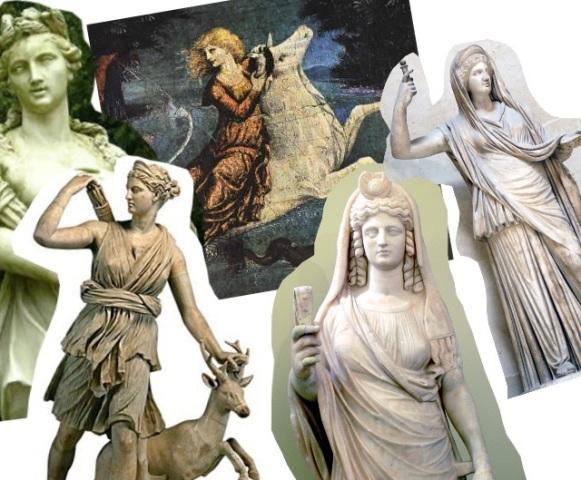Mythological Story Time

Pictured above (left to right): Front row – Medea, Artemis, Persephone, Cassandra. Back row – Europa.
April 14, 2015
Mythology is a weird, illogical, seemingly timeline-less occurrence of events with detailed and specific narratives, emotional rollercoasters of tales, and spiraling tragedies with intervening topics of cannibalism, incest, and blatant homoeroticism, and perhaps that is why we love it so much. We love the idea of classic heroes, such as Theseus, Odysseus, and Hercules, who go through torments and torture through the fault of their own, the fault of the gods, and the fault of plain misfortune, but still come out successful conquerors of evil and poor fate. Many of the most famous stories—Jason and the Argonauts, Odysseus and the Cyclops, the myth of Tantalus, the story of Hercules, and King Midas—all have one thing in common: they center around male heroes. Even most of the sidekicks tend to be male—not to say that women do not have a role in mythological stories. They do, though typically they are the mothers, the mistresses, the rape victims, or just existing for the sake of birthing new heroes for more generations of torturous and exciting adventures. That is not to say that there are not strong, independent women in mythological tales.
Artemis, the goddess of hunting and my personal favorite mythological figure, demands respect in more ways than one—sometimes by killing an entire hoard of children when their parents said their kids were better than her own, turning a man into a stag and watching his dog eat him when the man saw her naked, or maybe causing a man to go insane and set himself on fire when he refused to pay respect to her. In fact, many women in the tales of mythology are strong, intriguing characters, but their fellow characters and the storytellers treat them subpar at best.
Persephone, before she became the goddess of the Underworld, symbolized innocence and purity. If she had a blog, she would post pastels and pictures of sunflowers and pink sunsets; she was that girl. The way she met Hades was the way you would see in a movie—not a romantic comedy, but more like a classic horror film. She, personifying the acts of the innocent and pure, was plucking wild flowers while she treaded through a field when the ground cracked open and up rose Hades, who then dragged her to the Underworld, raped, and married her. Persephone added another notch to her belt; along with being one of the goddesses of spring and fertility, she became the queen of the Underworld.
It is quite a wicked story with Persephone being a whirlwind of contradictions from liking flowers to helping escort the souls of the dead with her misogynist husband, and I would tell Hades to go to hell if he were not already the king. I suppose one cannot expect the best behavior from the god of the Underworld, but can one not expect a hero to respect a woman?
In the case of Theseus, apparently not. Although notorious for being a woman-kidnapper and a rapist, he is best known as a strong hero, born of great strength and a destiny for wondrous adventure and tragedy. Perigune was the daughter of Sinis, a thief who would strap people’s arms to one tree and legs to another in order to rip them in half. She encountered the “greatness” of hero Theseus when he killed her father in the same way Sinis killed his own victims. She hid in the bushes and whispered to them that she would never harm them if they were to hide her from Theseus. Apparently, they did not do so well because he found her and persuaded her to leave the hidden fortress of the bushes. And then he raped her.
Maybe the heroes are not as great and heroic and moral as we now consider them to be. That could also be due to the patriarchal social acceptance of the rape of a woman; this caused people to overlook Theseus’ constant misogyny in favor of his awesome vengeance and experiences.
Then, there is the god we know and love: Zeus.
God of the sky with a weapon of a lightning bolt that he tended to hurl at those who wronged him or plainly annoyed him, Zeus was the god of all the Olympian gods. Although he was married to Hera (who interestingly was the goddess of marriage as well as Zeus’ sister), he tended to have many affairs. One of the more interesting affairs was with Europa, a Phoenician princess, who Zeus kidnapped to be his mistress. Europa had been plucking wildflowers from a seaside meadow when a great, white bull approached. Unknowing that the bull was only Zeus in disguise, she decorated the bull’s horns with flowers and sat upon his back, not noticing when they began to swim across the ocean to Crete. She then became Zeus’ mistress and had three children before he grew bored of her company and married her off to King Asterius. She deserved better than Zeus anyway.
In another story of awesome women who were wronged by men in their lives, there is Cassandra, daughter of Hecuba and King Priam of Troy. Cassandra, as most princesses were in Greek times and still are in modern times, was astonishingly beautiful; Apollo, god of music and twin brother to Artemis, noticed this. In modern times, we know Apollo as the god who had the daily task of carrying the sun by chariot across the sky so that the days would pass, and as most gods were, Apollo could be a bit of a flirt. Flirtatious and soon head over heels for the beautiful Cassandra, Apollo taught Cassandra the gift of prophecy in his love; however, when she refused to reciprocate his feelings and since there is no way to take back a gift, Apollo instead cursed her to never be believed when she gave a prophecy. When she later prophesized that Paris’ journey to Crete will end in disaster and the Trojan horse will be filled with Greek soldiers, she was distraught to find that no one will believe her. To make matters worse, when Troy falls, Locrian Ajax raped her, and she birthed two sons before she is taken as a slave to Agamemnon. This, perhaps, is one of the most iconic and catastrophic “nice guy reacts to being friend-zoned” scenarios to ever be imagined.
Women’s roles in mythological stories tend to be based around being screwed over, impregnated, raped, or in any other way wronged. Iphigenia, daughter of Agamemnon and Clytemnestra, was deceived by her own father. When Agamemnon—the slave-owner of Cassandra—told his daughter that she would be married off to Achilles, she agreed, and then Agamemnon sacrificed her to Artemis instead. Thyestes slept with his own daughter, when an oracle told him to, in order to have a son that would act as revenge to Atreus.
Mythology knows no limits of the taboo or the morally wrong, especially concerning the treatment of women, but they make pretty good stories.



